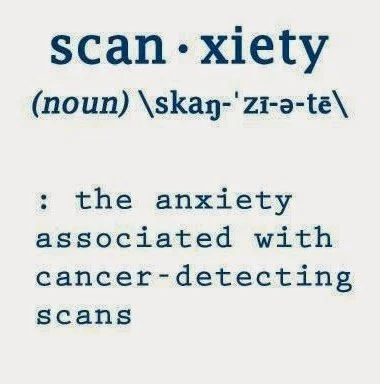An Unwanted Membership in Club Paranoia
"There is a lump on my face by my left ear," I inform the doctor, proud that my voice is clipped and analytical, with not a speck of the worry that affected the past three nights of sleep.
The doctor feels the lump for two seconds. Tops. "Swollen lymph node from your sinus infection." Apparently two can play the analytical game.
"Isn't it large for a lymph node?" I ask, my fingers involuntarily rubbing my skin. The lump feels like trouble.
The doctor looks up from her note taking. Maybe my voice isn't as nonchalant as I imagine.
She feels the spot again. She knows my history. She looks in my eyes. I see compassion. "If the lump is still there after you finish the antibiotic, come back and see me."
I nod numbly. Dad's cancer diagnosis began with a lump on his face.
Oh Jesus, help me.
As six-year cancer survivor, I would like to say the above scenario happened five years ago. Wrong. It happened four months ago. Every cancer survivor understands the paranoia that can attack with every little bump, sore throat, body ache and tired muscle. Sometimes we can be logical and realistic, but other times, nothing can dissuade us from believing the dragon is back, breathing down our necks.
And don't even get me started on the stuff that may get stirred up when it is time to go in for another test or scan. We even have our own term for it: Scanxiety!
Cancer comes with an entire roller coaster ride of emotions: anger, embarrassment, guilt, sadness, gratitude, love and resentment, to name a few, but the emotion every cancer survivor I interviewed mentioned was fear. Specifically, fear of recurrence.
The cancer is back. I just know the cancer is back.
Maybe the doctor didn't get it all.
I thought I was fine before and it was cancer. Will I ever be fine again?
What do you do with the fear of recurrence that shadows a cancer diagnosis?
1. Make A Plan for Anniversaries and Other Triggers
Sometimes I am affected by my yearly mammogram appointment (where I discovered I had breast cancer 6 years ago) and sometimes I am not. BUT - I always plan something fun for after that appointment, whether it is a walk around the rose garden near the facility or a lunch date with my husband or a friend afterward. Last year, on the anniversary of my mother's death from cancer, we left flowers to be found by strangers. On the anniversary of my dad's death from cancer, we went to Dad's favorite ice cream restaurant. Tying a happy memory to a difficult one has helped me deal with the anxiety of those anniversaries.
2. Be Gentle with Yourself.
Extend grace and kindness to yourself and your fears. Realize the fears are normal. Know that even if the anxiety doesn't totally disappear, the fear of recurrence does lessen in time.
3. Identify the Lie, Then Tell the Truth.
Many fears are based on the untruths we tell ourselves.
For example: I am the same age my mother was when she died. I'm going to die too.
All this stress is going to cause the cancer to come back. (If not stress, fill in the blank with something else.)
The doctor looked at me funny. He knows something I don't know.
Identifying and calling the fear by name is the first step in turning off the voice, Lynn Eib writes in Finding the Light in Cancer's Shadow. Eib says the next step was telling herself three truths: 1. That she was a survivor. 2. That nothing could separate her from God's love and 3. That God didn't need good odds to heal her. He could do the impossible.
4. Talk about Your Fear
Join a support group. Get counseling if necessary. Tell your story in a journal. Don't suppress the fear of recurrence or think you have to be positive all the time. Diffuse the power of the fear by getting it out in the open.
5. Don't Focus On What You Can't Control
Okay, let's face it. None of us counted on getting cancer the first time around, so knowing we can get cancer again (or that the cancer has spread) is a real possibility. That fear can be paralyzing. Focusing our energy there is a waste of time because we have no control of that part of our future.
But we can take stock of our lives, accept our mortality and make positive changes, whether it is to choose a healthy lifestyle or seek deeper spiritual meaning and purpose.
6. Pray"Cast all your anxiety on Him, for He cares for you." 1 Peter 5:17 NIV
Sounds like some good advice. Let's cancel that membership to Club Paranoia, or at least, leave the membership card in our pockets more often.
Where/when do you struggle the most with the fear of recurrence or that the cancer has spread? What helps you?
